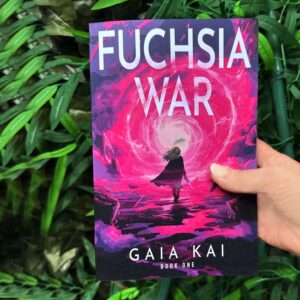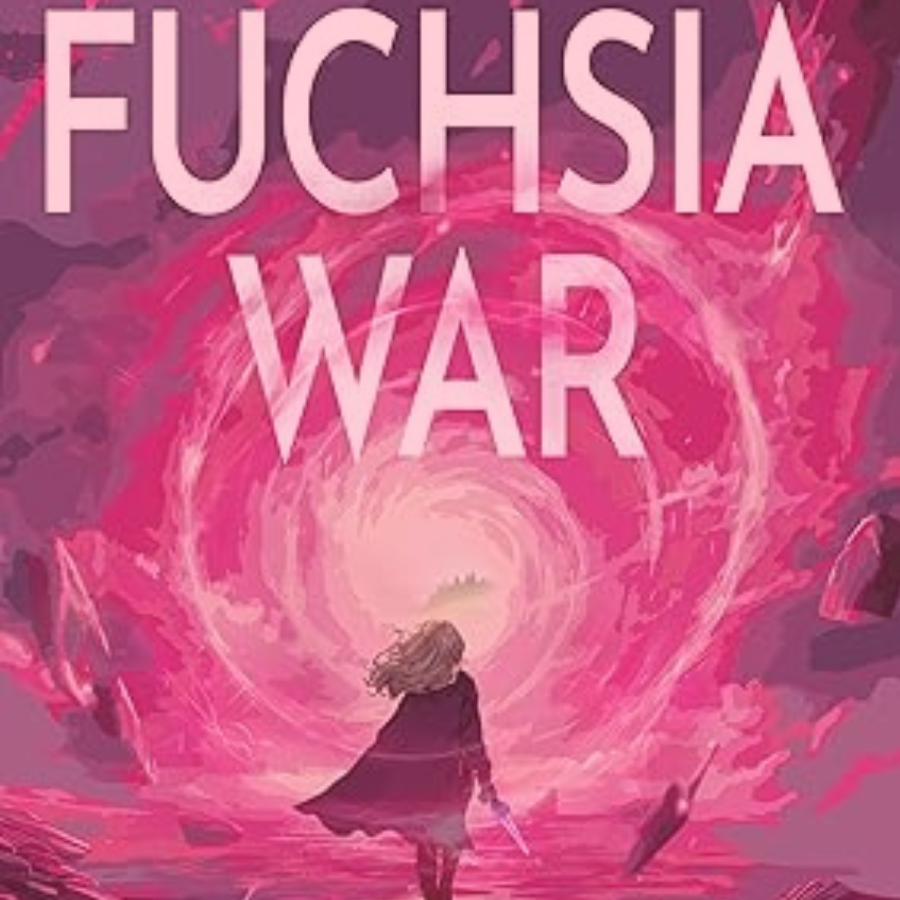This post may include affiliate links, which means we make a small commission on any sales. This commission helps Feminist Book Club pay our contributors, so thanks for supporting small, independent media!
In the time travel adventure Fuchsia War, author Gaia Kai brings to life a dystopian future in which women fight to reclaim their erased history. Here, Kai chats with Feminist Book Club about the inspiration behind the book, the ongoing battle over women’s bodies, and the call to resistance she hopes readers come away with.
What inspired you to write Fuchsia War? Was there a specific moment (hard to pick in this general hellscape, we understand) or idea that sparked it?
2021. Dismissing women’s experiences and their innate ability to understand and make decisions about their own bodies is inhumane. It sends the message that women don’t have control over their own lives—and worse, that their lives don’t matter. When strangers hold more power over a woman’s body than she does, women are no longer valued or have rights.This intrusion creates a chilling atmosphere of patriarchal control.
The inspiration for my time travel history comes from my experience teaching. I teach humanities and art history, and there are so many gaps and unknowns. I’ve always wished my superpower was to be able to travel back in time, invisible, to see how history really unfolded and to fill in gaps. I’ve spent a lot of time researching women in history, the art they have created or commissioned, comparing and contrasting how different civilizations treated women. Fueled by knowledge and fire in my blood, I channeled my energy into writing Fuchsia War.
Without giving away any spoilers, what core themes do you hope readers take away from this book?
I hope readers come away with a deeper awareness of women’s history—how much has been overlooked, erased, or silenced—and feel more connected to the ongoing fight for recognition, autonomy, and equity.
How does Fuchsia War take on ideas of gender, power, resistance, and patriarchy?
I take a hard-line approach with fierce female characters who will stop at nothing to forge a global matriarchy. It’s set in a world where men have triggered ecological collapse and erased women’s history in the wake of an uprising. Men destroyed Mother Earth and the only remedy is dismantling the patriarchy. Then, true healing may begin.
Time traveling is one of my personal favorite plot devices, but only if executed well. Fuchsia War handles time travel beautifully. How do you think time travel made your book stronger or more compelling?
Thank you! It was not easy. I spent several years reading time travel books, studying what worked and what didn’t. I probably wrote at least one hundred different versions of my book only because I struggled to get the time travel part just right. None felt right until I decided to treat time travel like a weapon, and a propeller of revolution and truth. I knew that I didn’t want the travels to focus on one specific time, so for the time travel scenes, I decided to approach them like I teach my humanities and art history classes— flyovers of key historical moments.
Dystopian and post-apocalyptic books can often feel bleak. How did you infuse hope into this narrative?
While some scenes lean into dystopia and darkness, others unfold as historical fiction, science fiction, or stories of women’s friendship within that shadowed world. At its heart, I wanted the stories I shared to ignite purpose and hope. My characters experience profound loss, but through friendship, knowledge, and a sense of purpose, they begin to shape a better future. There is always light within the dark, especially in a world shaped by a global matriarchy.

What do you think makes a book feminist? How do you see Fuchsia War contributing to feminist literature today?
It imagines a global matriarchy where Earth is healthy, and women’s history is untainted. Fuchsia War not only challenges the patriarchy, it sets out to dismantle it. Hopefully, the story lingers, fueling conversations and inviting questioning. Ideally, it will inspire women to become more aware, to support one another, to speak loudly, and to take up space.
Do you perceive Fuchsia War to be in conversation with other books, authors, films, or other pieces of media? Which ones?
I hope it’s seen as an Orwellian cautionary tale with a feminist, ecological twist. All of these raise profound awareness, and I can only hope my book sparks a similar kind of reflection and rage. The film Promising Young Woman. Books: Women Talking [by Miriam Toews] and Margaret Atwood’s The Handmaid’s Tale. Also, author Elena Ferrante writes with such raw power. I just read Girls Burn Brighter by Shobha Rao, and I’m still thinking about it. Additionally, I feel Fuchsia War is in alignment with the work of artist Shahzia Sikander. She created a beautiful 18-foot-tall bronze monument to women and justice, which the University of Houston displayed. It was beheaded. Erased. Yes, I’m serious. And Shahzia was censored from giving an artist talk.
Can you share a passage or scene from the book that you feel especially embodies the heart of the story?
“I’d like to take the girl away from them and hug her tightly. I’d like to protect her, to take her under my wing, though I know the wings I’ve been given are not for this sort of refuge. Mine would train her to kill, to protect herself.”
Is Fuchsia War a standalone book or is this part of a larger conversation you hope to keep building?
Book 2 is in the works, and I’m excited to continue developing these characters and sharing the stories of the women in history I’ve written about. Their stories are deeply inspirational. And there’s so much history to uncover. Time travel is endless.
Fill in the blank: Readers who like The Power by Naomi Alderman will love Fuchsia War.
Keep up with Kai and her work at her website!

